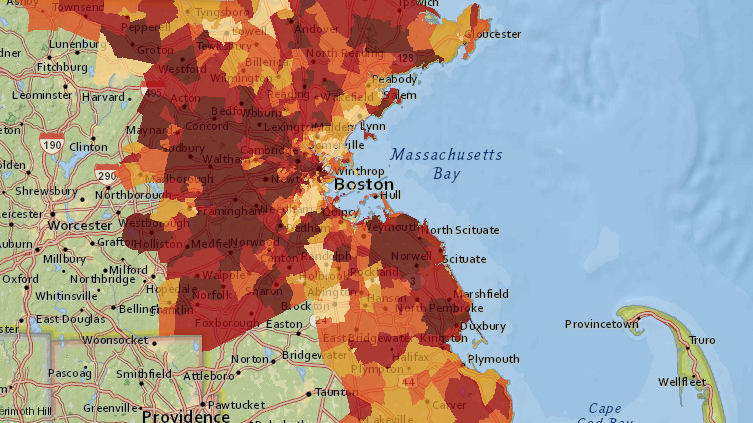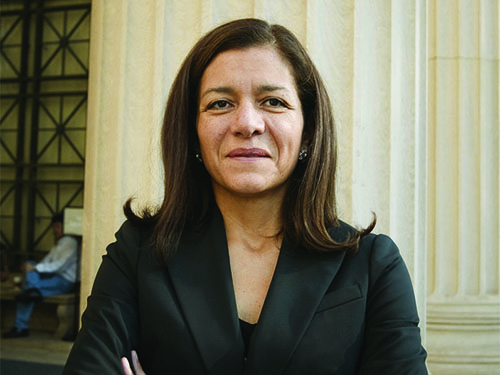The Institute for Child, Youth, and Family Policy, led by Professor Dolores Acevedo-Garcia, has received a three-year, approximately $3 million grant from the Robert Wood Johnson Foundation (RWJF) to expand the impact of the Child Opportunity Index (COI). The COI is a key component of her team’s longstanding project, diversitydatakids.org, a comprehensive research program and indicator database on child wellbeing and opportunity, with a focus on racial/ethnic equity across multiple sectors (e.g., education, health, and housing) and geographies in the United States.
Principal Investigator (PI) Acevedo-Garcia and her team have been mapping the geography of opportunity in the United States for over a decade, launching the pioneering Child Opportunity Index (COI) in 2014, in partnership with the Kirwan Institute for the Study of Race and Ethnicity at The Ohio State University. The COI allows users to map the geographic distribution of neighborhood opportunity in the 100 largest metropolitan areas for children by race/ethnicity.
Their analysis has shown significant variation in opportunity levels within metro areas and a consistent pattern of inequity, where black and Hispanic kids live in the lowest opportunity neighborhoods. Acevedo-Garcia explains, “Neighborhood quality is about more than poverty. Black and Hispanic children tend to live in the neighborhoods that also have worse schools, parks, housing—everything that makes a good neighborhood environment for a child.”
For Acevedo-Garcia and her team, the COI forms part of what she calls the “data-for-equity pipeline,” her vision and approach for ensuring that the data and analysis they produce lead to improved equity for children in the real world. Though the data is available online for anyone to use, the team has formed many successful partnerships with data users around the country—and this new funding from RWJF will allow them to explore and better understand those partnerships.
“COI users have included hospital systems, academic researchers, municipal governments, nonprofit organizations and public health departments,” says co-PI Clemens Noelke. “Users have come to us to create their own version of the COI for their communities, or to develop their own opportunity tracking systems modeled after the COI. It’s incredible to witness the growing demand for the data and the many uses it has been put to. We are very excited to take a closer look at how the data is being utilized, how we can make it more user-friendly, and how we can better support users’ applications of the COI in their communities.”
In addition to funding the team to take a more systematic approach to user engagement, this grant also allows them to do rigorous research on how and why data projects like the COI can have an impact in communities on the ground. With the help of partners at the Children’s Hospital Association and the City and Regional Planning Program at The Ohio State University, the team will focus their attention on how users access and utilize the data, any barriers they may face, and what sectors may find the COI particularly helpful.
“I am excited to have the opportunity to collaborate with the team to better understand how community stakeholders and practitioners engage with this robust data tool,” says Jason Reece, Assistant Professor of City and Regional Planning in the Knowlton School at The Ohio State University. “We will examine how this unique data tool helps communities understand the intersection of place, the social and built environment, and health, and document how mapping data has informed intervention activities to support health equity.”
“I’m immensely proud of the work this team has already accomplished, and the many examples of real-world impact they have collected over the years,” says Heller Dean David Weil. “What’s truly exciting about this new funding is that it will allow the team to focus on broadening that impact and refining their user engagement strategy going forward.”
“There is growing evidence that neighborhoods are critical to child health and wellbeing,” says Acevedo-Garcia. “The COI is already helping a range of stakeholders monitor and improve neighborhood conditions. Better information about how stakeholders use the COI to create change in their communities will enhance its creators’ ability to replicate, spread and amplify the impact of the COI, advancing our efforts to build a Culture of Health for all.”
For Acevedo-Garcia, the grant represents a welcome possibility to rigorously reflect on a decade of opportunity data mapping work. “We’ve been doing this for a long time, but with this award we’ll be spending more time looking at our users than any grant has allowed us to do in the past. We must be extremely thoughtful about defining impact, which may range from communities being more aware of equity issues, to actually allocating resources to reduce neighborhood inequities.”


